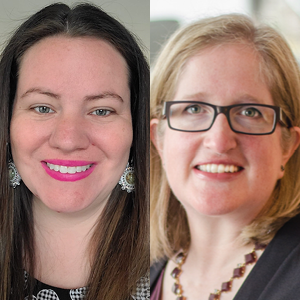Many countries are struggling to come to terms with their history of injustice toward Indigenous peoples. Such efforts have gained momentum in Canada in recent years, and include rethinking the place of Indigenous knowledge in higher education.

One example? Queen’s University in Ontario, Canada, where Professors Lindsay (Kawennenhá:wi) Brant and Kate Rowbotham developed their course “Relationships and Reconciliation in Business and Beyond.” The course, which was recognized with an Aspen Institute Ideas Worth Teaching Award, explores business issues from a spectrum of Indigenous perspectives. We spoke with Professors Brant and Rowbotham about their course and the importance of centering diverse Indigenous perspectives.
![]()
What lead you to develop this course, and how do Indigenous perspectives speak to the need for change in business practice at this moment in time?
This course was first conceived of in the Winter of 2020 to put into action one specific recommendation of Queen’s University’s Truth and Reconciliation Commission Task Force Final Report, which is that “each program at Queen’s must include significant and meaningful Indigenous content”. We saw a huge gap in the level of inclusion of Indigenous content within the commerce program and wanted to create a course that would not only begin to fill this gap but create space for both Indigenous and non-Indigenous students to learn together about Indigenous issues in an accountable, caring, and supportive classroom community.
By learning about Indigenous cultures, ways of knowing, and worldviews, we can help business students to imagine alternative approaches to commerce, exchange, and capital. The course really focuses on the importance of meaningful relationship building and capacity building, which will be important skills to continuously develop and apply within whatever organizations/businesses/non-profits students might find themselves working in.
One thing that’s especially impressive about the course is that you don’t just talk about pre-contact Indigenous knowledge, you highlight the complexity of contemporary Indigenous experience in business—from entrepreneurship to Indigenous rights in tension with green energy development to discrimination in the corporate world. Why was it so important to showcase this variety?
Through showcasing the complexities of contemporary Indigenous experiences in business we can highlight for students just how many barriers Indigenous peoples have faced when it comes to becoming entrepreneurs or working within big corporations, and yet despite these challenges so many Indigenous peoples are carving out unique opportunities for themselves, their families, and their communities.
Highlighting both the challenges and success stories of Indigenous entrepreneurs helps to breakdown stereotypes and common misconceptions that Indigenous peoples are stuck in the past and cannot thrive in contemporary business environments. Providing various case studies and examples allows students to critically examine and solve the most pressing issues facing Indigenous peoples in business and highlights the need to question, reimagine, and reform existing structures and policies so that Indigenous peoples can thrive.
Can you describe how the “ungrading” assessment functions in this course, and how it fits with your ideas of the pedagogy of peace?
The “ungrading” style of assessments in the course is something that the students have highlighted as pivotal to their learning experience. We ask our students to write reflective journals that focus on their key takeaways, key points of frustration or areas for further learning, and to document their own personal growth or development throughout the course. In this way, they can de-emphasize the competitive aspect of grading and re-evaluate what it truly means to learn. Students have expressed that this allows them to fully embrace the learning journey and makes making mistakes and missteps a natural and expected part of the experience. It removes the pressure to perform and allows them to focus mainly on their own growth over time.
The pedagogy of peace is a wholistic model of teaching and learning grounded in critical Indigenous pedagogy that prioritizes peace, strength, a good mind, and the overall concept of self-in-relation. We focus on these core values and work to embody them individually and collectively to create a classroom community that is based on care, reciprocal trust, and respect. You can learn more about this model here: Pedagogy of Peace.
As alumni from your course go into leadership positions across industries and sectors, what is the one lesson that you hope will stick with them throughout their careers?
We hope that the students will carry with them the emphasis on care, relationship building, and the commitment to reflecting on our own responsibilities and contributions as leaders, learners, and caring humans. This values-based approach, along with a commitment to always nurturing a growth mindset, will carry them far as leaders across industries and sectors of their choosing. A key highlight for many students is the focus at the end of the course on what it means to be an aspiring ally for Indigenous peoples, and how they can take actionable steps to mobilize the knowledge they’ve gained in the course to carry it forward into their future careers and life experiences.
![]()
Interested in more innovative insights for business education? Browse our complete collection of interviews with outstanding educators, and subscribe to our weekly Ideas Worth Teaching digest!

